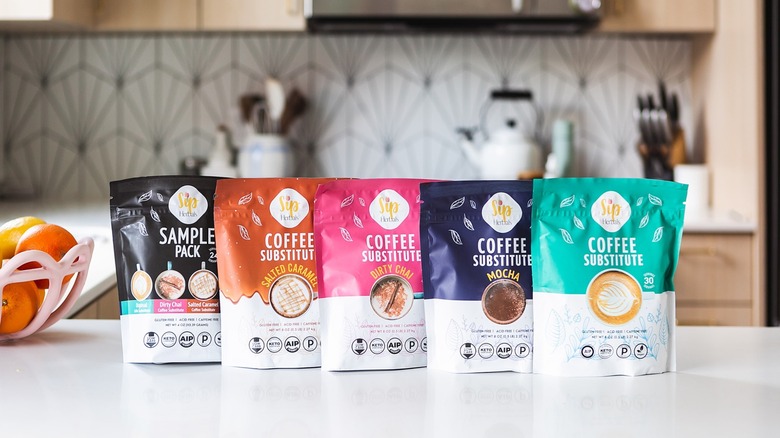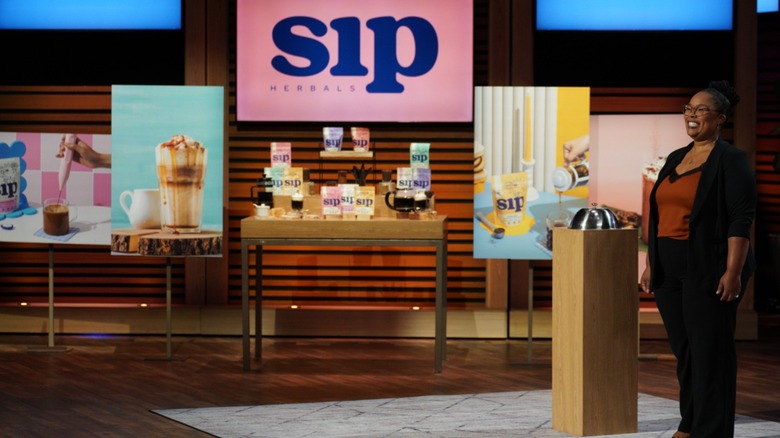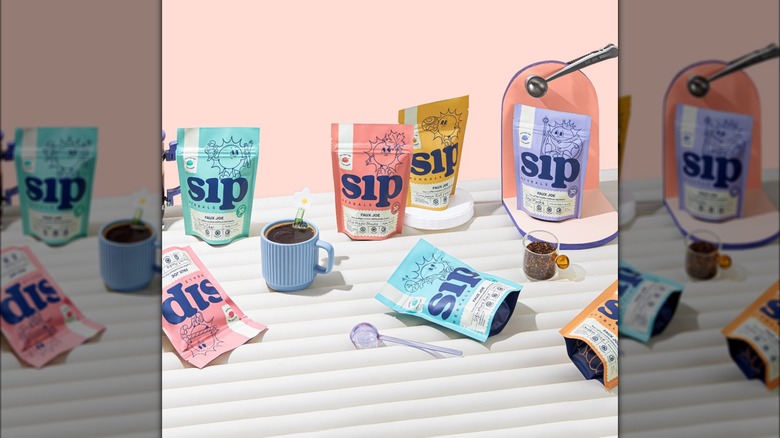Sip Herbals: Here's What Happened After Shark Tank
Sip Herbals' founder Orleatha Smith struggled with a common problem many: She liked her morning coffee but not what came after drinking it. Caffeine can trigger many side effects, including increased heart rate, anxiety, and edginess (via Mayo Clinic). Informally known as caffeine jitters, these symptoms aren't just longstanding myths about coffee but are often the price to pay for a morning perk. And so Sip Herbals aimed to provide an alternative to these jitters when the company appeared on Season 15, Episode 22 of "Shark Tank" in early May 2024.
Since childhood, Smith had grown up with a holistic approach to food after a severe case of eczema led to her spending a month at the Mayo Clinic. Though she always had an understanding of the nourishing power of food, the idea for Sip Herbals came to Smith after she was diagnosed with an autoimmune disease. The condition meant that she had to watch everything she ate or drank — including coffee.
"I had been dealing with anxiety, jitters[,] and stomach trouble every day and figured out that it was caffeine causing it," she said to the Montgomery Bay Herb Co. But Smith also had a fondness for coffee and wasn't willing to give it up, so she came up with a solution. Using her background in biology and the software industry, Smith launched Sip Herbals — a line of prebiotic, caffeine-free coffee substitutes made from a blend of herbs and plants that provides everything many love about coffee sans drawbacks.
What happened to Sip Herbals on Shark Tank?
Armed with her 'faux joes,' Orleatha Smith walked into "Shark Tank" seeking a $100,000 investment in exchange for a 10% stake in Sip Herbals. For most of the segment, it looked like Smith had everything she needed to walk away with a deal.
Sip Herbals' blends use roasted carob, dandelion, and chicory as its base — an herb that's known to taste much like coffee. In fact, chicory has a longstanding history in Louisiana where Smith's family comes from. It rose in popularity during the Civil War when New Orleanians turned towards the coffee-like herb to make up for the dwindling supplies of beans. Chicory aside, Smith claimed that Sip Herbals' brews have a full-bodied mouthfeel that one would expect from coffee and that it also gave the satisfaction of popular coffeehouse flavors with variants such as cinnamon roll and peppermint mocha.
More importantly, Sip Herbals had the numbers to back it up. A bag of 30 servings cost just under $3.50 to make and retailed for $19 to $24. With substantial profit margins, the company was on track to make $250,000 — a fact that earned applause from Mark Cuban (who is set to leave "Shark Tank" after this season). However, cutting out traditional coffee from their daily routines was not something all the Sharks wanted to do, and the general consensus across the panel was that Sip Herbals simply wasn't an investable business. Ultimately, Smith left the Tank without any offers.
Sip Herbals after Shark Tank and what's next
Appearing on "Shark Tank" has its perks beyond just securing an investment: It also provides small-scale businesses with valuable publicity and national exposure. And by the looks of it, Sip Herbals is making the most of it. The official website currently lists an "As Seen on 'Shark Tank' Sample Bundle" at a discounted price with the same three flavors the Sharks tasted on the show — signature roast, salted maple blondie, and dirty chai.
While Sip Herbals mostly sells its blends via its website and Amazon, founder Orleatha Smith mentioned in the Tank that the company was focused on expanding its retail presence. Sip Herbals had orders from Lazy Acres Market and New Leaf Market that it hoped to fund with the investment. Future plans also include taking Sip Herbals to chains like Plum Market and Erewhon (one of America's most expensive grocery chains), and eventually to coffee shops where people can order the prebiotic blends right alongside caffeinated javas.
Though Smith walked away without a deal, the entrepreneur might just find another way to scale Sip Herbals. After all, she raised money on Kickstarter in the past and grew the company exponentially with that initial $7,000 investment. Besides, the global coffee substitute industry is valued at $2.7 billion in 2024 and is predicted to nearly double by 2031 according to DataM Intelligence. So, if all goes well, Sip Herbals might just make a place for itself in the growing industry.



